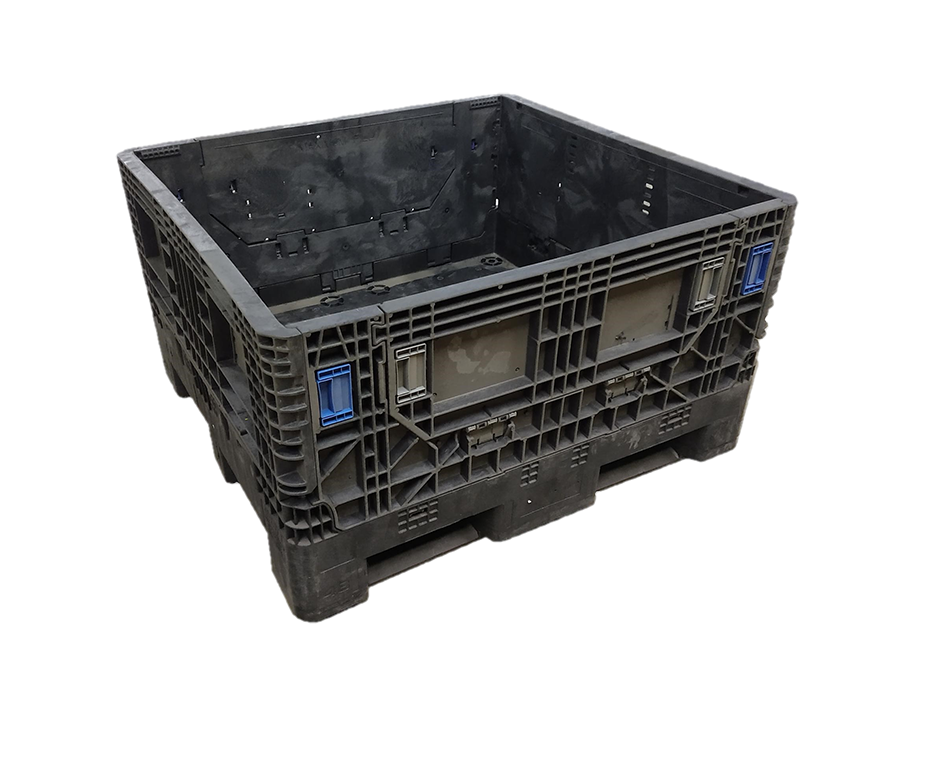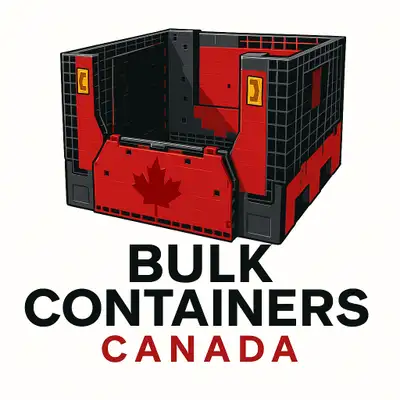Learn how used collapsible containers help optimize your supply chain flow
Wiki Article
Why Mass Containers Are Necessary for Cost-efficient and sustainable Transportation
Mass containers play a vital duty in modern logistics. They promote the efficient activity of big quantities of products, consequently optimizing transportation procedures. This technique not just minimizes costs yet also reduces environmental influence with lower discharges and waste generation. As markets look for more sustainable practices, the fostering of mass containers is coming to be increasingly significant. What effects does this change hold for future logistics and supply chain administration?
The Advantages of Utilizing Bulk Containers in Logistics
Mass containers revolutionize logistics by improving performance and sustainability. These containers permit the transportation of large quantities of goods in a single journey, substantially decreasing the variety of trips called for. This not only simplifies operations yet additionally minimizes labor costs related to handling, packing, and dumping. Furthermore, bulk containers are designed to maximize space use within transportation vehicles, making sure that even more products can be delivered simultaneously.The standardization of bulk containers likewise simplifies the logistics process. With uniform measurements, they can be conveniently stacked and stored, causing boosted warehouse monitoring. Moreover, mass containers typically feature long lasting materials that shield components from damage during transit, therefore decreasing product loss and raising general reliability. As a result, companies can experience improved supply chain efficiency, ultimately resulting in boosted productivity and customer contentment. This combination of variables makes bulk containers a vital property in modern-day logistics.
Environmental Influence: Reducing Waste and Carbon Footprint
As industries progressively prioritize sustainability, the adoption of bulk containers has actually become an essential strategy for minimizing waste and reducing carbon impacts. These containers reduce using product packaging products, such as boxes and plastic, thus especially lowering general waste generation. By settling deliveries, bulk containers enhance transportation effectiveness, enabling even more items to be transferred per trip. This decrease in trips directly correlates with lower greenhouse gas exhausts, adding to a smaller carbon impact.Mass containers can commonly be recycled or recycled, further alleviating ecological effect. The resilience of these containers guarantees they can withstand numerous transportation cycles, minimizing the requirement for single-use choices. used collapsible bulk containers. By simplifying logistics and advertising reliable resource usage, mass containers not only sustain sustainable methods but also urge markets to align with worldwide ecological objectives. Ultimately, their implementation mirrors a dedication to ecological stewardship and responsible source management
Price Financial Savings: Exactly How Bulk Containers Lower Transportation Costs
While numerous business look for methods to boost their profits, making use of bulk containers provides a substantial chance for reducing transportation expenditures. Bulk containers optimize the volume of items transported, enabling companies to deliver larger quantities at the same time. This performance minimizes the number of trips needed, straight reducing gas costs and minimizing labor expenditures associated with loading and dumping.Furthermore, bulk containers commonly feature structured layouts that maximize area usage within transport lorries. This means less voids, resulting in a lot more effective usage of available capability. The durability of mass containers can reduce the risk of item damage throughout transportation, minimizing losses and ensuring that even more goods show up undamaged.
Enhancing Supply Chain Efficiency With Mass Storage Space Solutions
Mass storage space options play an important function in enhancing supply chain efficiency by maximizing supply administration. By combining items into fewer, bigger containers, companies can substantially minimize handling expenses related to regular transfers and processing. This structured strategy allows for better tracking and management of stock, inevitably causing enhanced functional performance.Structured Inventory Monitoring
Reliable inventory monitoring is essential for enhancing supply chain procedures, especially when organizations take on bulk storage services. These options allow businesses to maintain greater supply degrees while lessening the regularity of replenishment. By combining materials into mass containers, firms can streamline their inventory procedures, lowering the intricacy connected with tracking multiple smaller bundles. This technique promotes exact stock counts and improves forecasting precision, enabling more informed decision-making. Furthermore, mass storage space options simplify storage facility organization, making it simpler to locate and accessibility products when needed. Because of this, companies can achieve an extra efficient stock turnover rate, ultimately improving overall supply chain performance and decreasing the possibility of stockouts or overstock circumstances.
Minimized Handling Expenses
The execution of mass storage space options not only simplifies inventory monitoring yet additionally substantially minimizes handling prices throughout the supply chain. By consolidating products into mass containers, companies minimize the need for constant handling and transfer in between different storage and transportation devices. This technique minimizes labor costs connected with loading, unloading, and relocating smaller get more info bundles. Furthermore, mass storage space lowers the regularity of shipments, leading to reduced transport prices and reduced gas usage. Because of this, businesses can maximize their logistics procedures, enabling an extra effective appropriation of resources. Inevitably, minimized managing costs add to improved total supply chain effectiveness, promoting an atmosphere that sustains both sustainability and economic practicality.
Versatility of Bulk Containers Across Numerous Industries
Although lots of industries have distinctive demands for transport and storage, bulk containers have actually become a flexible solution that satisfies a vast variety of requirements. These containers, ranging from big containers to specialized containers, can suit varied products, consisting of fluids, granules, and powders. In the farming industry, mass containers help with the transport of grains and plant foods, while the food and beverage industry uses them for active ingredients and ended up products. The chemical industry relies upon bulk containers for safely transporting harmful materials, guaranteeing compliance with safety and security guidelines. Additionally, building firms gain from mass containers for transporting accumulations and various other products. Their adaptability reaches various settings of transport, including trucks, trains, and ships, boosting logistical effectiveness. This adaptability not only enhances operations throughout different industries however additionally advertises sustainability by minimizing packaging waste and enhancing area en route. Bulk containers play a crucial role in contemporary supply chain administration.Future Patterns in Mass Container Use and Sustainability
The future of bulk container use is significantly formed by innovative materials development that boosts sustainability. Furthermore, automation in logistics guarantees to improve procedures, decreasing waste and enhancing effectiveness. Embracing circular economic situation practices will certainly better reinvent how bulk containers are developed, used, and recycled, fostering a more lasting transportation landscape.Innovative Products Development
As industries progressively prioritize sustainability, innovative materials development wholesale containers emerges as a significant consider boosting green transportation options. Scientists and suppliers are discovering eco-friendly plastics, recycled composites, and lightweight steels to decrease environmental influence. These products not just decrease waste yet likewise improve fuel effectiveness by decreasing the total weight of containers. Additionally, developments in smart materials, which can adjust to varying problems, improve the toughness and performance of mass containers. The assimilation of these ingenious materials aligns with round economic situation concepts, promoting reuse and recycling. As the demand for lasting methods grows, the development of such products will certainly play an essential function fit the future of mass container usage in logistics and transport.Automation in Logistics
Substantial improvements in automation are poised to change logistics and the use of bulk containers, enhancing sustainability in transportation. Automated systems, consisting of drones and independent cars, are improving the motion of bulk containers, decreasing the dependence on standard fuel-powered transportation. These innovations optimize routing and loading procedures, improving and lessening vacant miles fuel efficiency. Additionally, automated stock monitoring systems boost tracking and monitoring of mass containers, guaranteeing better source appropriation and minimized waste. The assimilation of the Web of Points (IoT) enables real-time information analysis, making it possible for aggressive decision-making that straightens with sustainability objectives. As automation remains to progress, it is expected to drive further advancements in bulk container usage, inevitably sustaining more lasting logistics techniques and reducing the ecological influence of transportation.Circular Economic Situation Practices
Advancements in automation are establishing the phase for an extra integrated strategy to circular economic situation practices in the domain name of bulk container usage. As sectors increasingly welcome sustainability, mass containers are being developed for long life and reusability. This shift not only decreases waste however also boosts resource effectiveness. Companies are taking on methods such as closed-loop systems, where used containers are gathered, reconditioned, and reintroduced right into the supply chain. Additionally, clever technologies track container life process, assisting in better monitoring and lowering environmental effect. The cooperation in between suppliers, logistics companies, and end-users is vital in establishing requirements for sustainable container usage. used bulk containers. Future trends suggest a growing emphasis on products that are naturally degradable and recyclable, more reinforcing the round economic situation's concepts in mass transport
Regularly Asked Concerns
What Materials Are Bulk Containers Commonly Made From?
Bulk containers are normally built from sturdy materials such as high-density polyethylene, cardboard, light weight aluminum, and steel. These products offer stamina, convenience, and security, making them ideal for delivering various products in different markets successfully.Exactly how Do I Select the Right Size Mass Container?
Choosing the best dimension mass container entails reviewing the volume of materials to be moved, considering taking care of tools compatibility, and evaluating storage room demands. Appropriate size assurances efficiency in transport and lessens waste during shipment.Are Bulk Containers Reusable or Recyclable?
Mass containers are usually multiple-use, made for multiple trips, improving sustainability. Numerous can likewise be reused, relying on the products made use of. Choosing recyclable options further minimizes and sustains environmental goals waste in transport methods.What Safety Regulations Relate To Bulk Container Transport?
Security regulations for mass container transportation include conformity with the Department of Transport standards, proper labeling of hazardous products, structural honesty evaluations, and adherence to weight limits to ensure safe handling and avoid crashes throughout transportation.Just How Can Organizations Transition to Making Use Of Bulk Containers Successfully?
Companies can change to bulk containers by reviewing current logistics, training personnel on handling, buying suitable equipment, optimizing supply administration, and working together with providers to ensure compatibility and performance throughout the supply chain.
As markets significantly prioritize sustainability, the adoption of mass containers has emerged as a vital method for reducing waste and reducing carbon impacts. By consolidating materials right into mass containers, business can streamline their supply processes, reducing the intricacy associated with tracking numerous smaller sized bundles. As industries significantly prioritize sustainability, cutting-edge products growth in bulk containers emerges as a substantial element in improving eco-friendly transportation options. Automated systems, consisting of drones and independent lorries, are improving the motion of mass containers, lowering the reliance on traditional fuel-powered transport. Furthermore, automated stock administration systems boost monitoring and monitoring of bulk containers, ensuring much better source allocation and lowered waste.
Report this wiki page